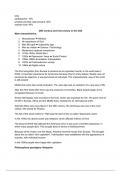Notas de lectura
Apuntes directos de clase de literatura norteamericana
- Institución
- Universidad De La Laguna (ULL)
Son los apuntes sin refinar de Literatura Norteamericana, toda la teoría. Para apuntes refinados tengo otro documento en venta.
[Mostrar más]



